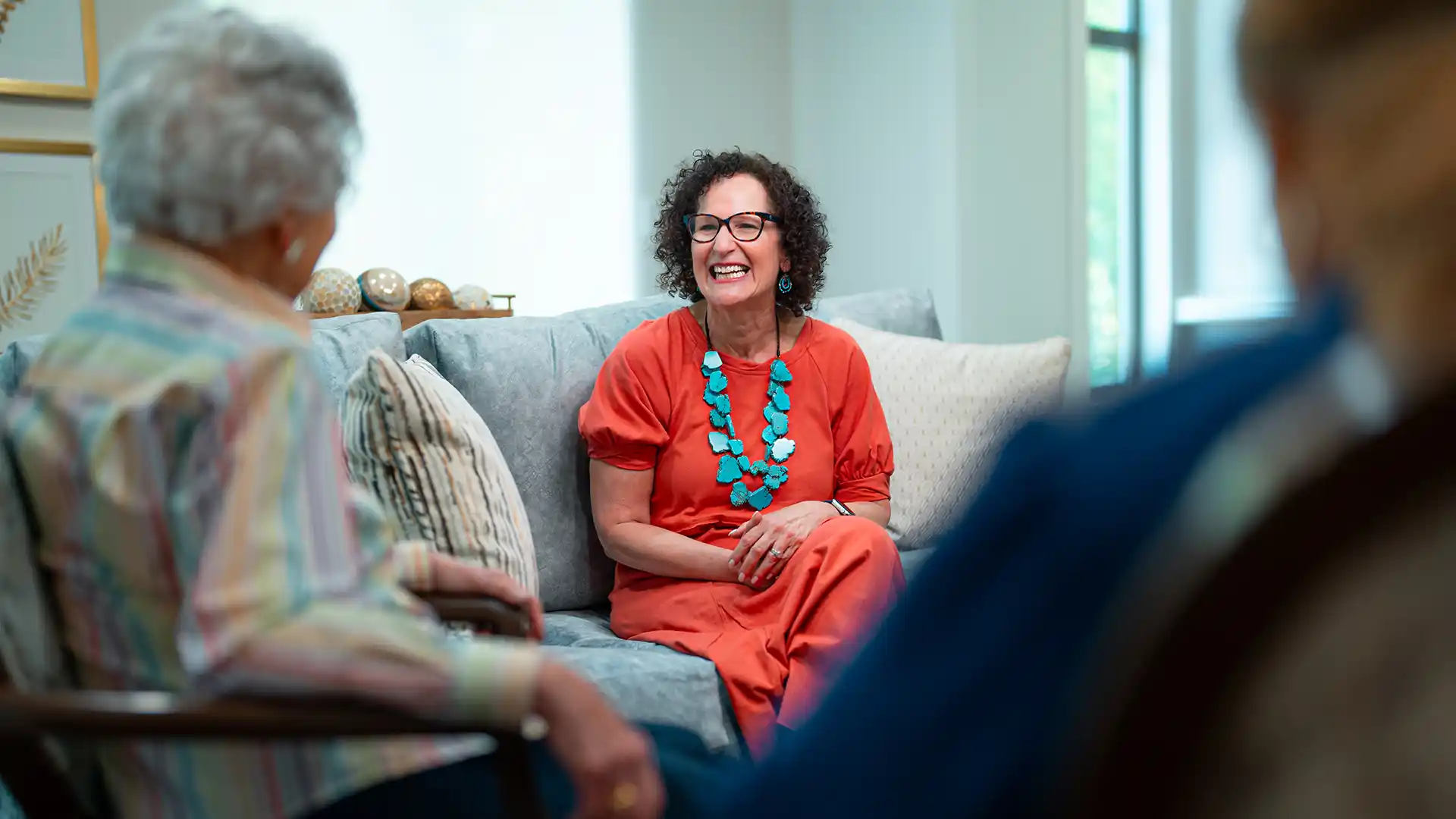When many seniors (or their loved ones) consider a move to assisted living, they’re thinking in terms of safety and daily living. However, another advantage that deserves consideration is the built-in social network within an assisted living community.
Assisted living provides a natural environment for friendships to flourish. Among the many social benefits of assisted living, the community setting diminishes a senior’s chances of loneliness. Community living offers each resident an opportunity to establish a sense of purpose and maximize the mental and physical health benefits of social relationships.
Benefits of Social Engagement for Seniors
Living well isn’t just about surviving; it’s about thriving, too. For most humans, feeling connected to others is vital to living a life that brings you joy and pleasure.
Many seniors view living at home as the ultimate expression of their independence. However, for those who outlive a spouse or live alone for other reasons, that solitude can come at a price.
While it’s certainly possible to feel lonely while surrounded by other people, social isolation (being physically removed from others) puts you at greater risk for developing feelings of loneliness. As you age and your health changes, your social circle naturally diminishes. Natural aging experiences, such as loss of vision or hearing or limited mobility, may also contribute to a sense of social isolation, or a lack of social interaction.
It’s very normal for someone who is lonely to feel sad, but over time loneliness can actually pose a significant risk to a senior’s overall well-being.
As one might expect, studies have shown links between loneliness and anxiety or depression. Much more than mere sadness, depression is a serious mental health condition that can take a significant toll on your overall well-being.
Beyond the mental health implications, researchers have also found correlations between loneliness and cognitive decline, including an increased risk of dementia. This makes sense when you consider that seniors with an active social life are regularly practicing language skills and participating in activities that engage the brain in meaningful ways.
Seniors with strong social ties also have lower risks for a variety of medical conditions, including heart disease, and may even live longer. The correlation between socialization and physical health is actually quite logical. Those who are socially engaged are more likely to be out and about, participating in activities that encourage movement and keep the cardiovascular system engaged.
There’s even some data indicating that individuals who are socially isolated have weaker immune systems. That’s due, in part, to the body’s natural chemistry. People who are less socially active tend to have lower levels of immune response hormones. Other factors include the negative impact stress has on your immune system and limited exposure to potential threats (such as germs) that activate an immune system response.
Another potential influence on your immune system and overall health is poor sleep quality. Studies have shown that individuals with limited social connections tend to have lower sleep quality, and poor sleep quality limits your body’s ability to rejuvenate and fight infections.
Conversely, the National Institutes of Health reports that not only having social connections but having quality social connections can improve your quality of sleep. In other words, having close, supportive relationships has a more positive impact on your sleep than contentious or ambivalent relationships.
Harnessing the Social Benefits of Assisted Living
As a resident of an assisted living neighborhood, you have a built-in community just outside your front door, so it’s easy to begin reaping the social benefits of assisted living. Your neighbors are in the same stage of life, and many likely share your interests and even some of the same challenges. There’s plenty of common ground for bonding.
Fortunately, proximity is just one way that assisted living can support your social connectivity. Assisted living care teams are experienced at fostering connection and companionship among older adults. You’ll find an array of vibrant social opportunities that allow you to explore new friendships and reduce your sense of isolation.
Take advantage of personal introductions.
Choosing a friendly and inviting community means you can count on a warm welcome when you arrive. Some of your first relationships will be with your care team members, but you’ll quickly begin meeting others as well. You can count on the care team to make introductions to your neighbors and others in the community so you can start forming senior living connections right away.
Drop in on scheduled activities.
Living in an assisted living community means never having to be alone—if you don’t want to be, that is. You can count on the community activities director to keep the calendar full of all kinds of options to help fill your day in productive ways, from classes to book clubs to social gatherings. You may even be able to join a group on an outing to a local place of interest or participate in a volunteer event. No matter what activity you choose, you’re sure to do it in good company. Then, after a fun-filled day of socializing, your private apartment offers a welcome retreat so you can rest and recharge.
Meet others who share your hobbies.
Common interests are a wonderful foundation for striking up a conversation with a new friend. If you love to read, visiting the community library is a good place to find others who share your passion for books. Some communities also offer special amenities like personal garden plots or a woodworking shop where you can revisit an old hobby or explore a new pastime with others who find joy in the same activities.
Make good use of the community amenities.
A community’s amenities often play a major role in your decision to join the community. Once you move in, you’ll be able to take advantage of those amenities along with others who were drawn by the same features. You may delight in exploring the grounds or taking in an on-site movie. The wellness center is another place where you’re likely to find potential new friends, such as a workout buddy or a group who enjoys the same fitness classes as you.
Share your skills or talents with others.
You can put your years of experience to good use by sharing what you know with your neighbors and finding out what you can learn in turn. Educational experiences unite older adults who value learning for the pure joy of knowledge. You may be surprised by how rewarding it can be to teach your neighbors something new by sharing your expertise on a skill or subject, then learn from their unique experiences, too.
Visit the common areas and introduce yourself.
Whether you pull up an empty seat in the dining room or join a group gathered around a game table in a living area, you’re sure to receive a warm welcome. After all, your neighbors remember what it was like to be the new kid on the block. They’ll undoubtedly be curious to meet and learn more about the colorful threads you bring to weave into the tapestry of the community.
Find New Friends in the Atlanta Area
Finding a senior living community that feels like home is the first step toward building meaningful relationships that improve your everyday life. Canterbury Court’s Azalea View assisted living neighborhood, located in Atlanta’s Buckhead area, offers the perfect blend of personalized assistance to protect your autonomy and social engagement so you can enjoy the social benefits of assisted living and a well-balanced lifestyle.
Residents come together for a range of organized outings: visiting local shopping, entertainment and dining in the area. A beautiful common-area living room is perfect for playing games with friends, while others opt to join friends for a workout in the heated pool or exercise room.
We encourage you to come meet some current residents and see how the community supports senior living friendships. Get in touch to make plans to visit.

